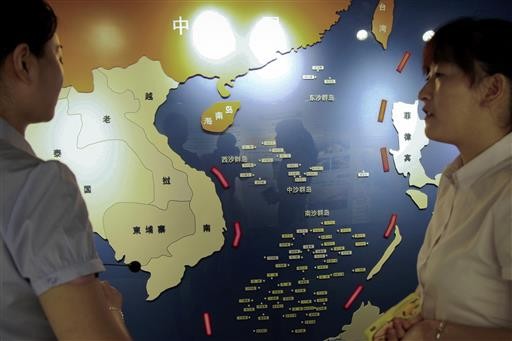Popular Reads
Top Results
Can't find what you're looking for?
View all search resultsPopular Reads
Top Results
Can't find what you're looking for?
View all search resultsSouth China Sea to not feature on Duterte’s Japan visit agenda
Change text size
Gift Premium Articles
to Anyone
T
he Philippine government on Monday announced that the South China Sea dispute would take a backseat during President Rodrigo Duterte’s visit to Japan this week that is meant to boost a 60-year-old relationship.
Amid global confusion over President Rodrigo Duterte’s announced “separation” from the US and strengthening of ties with Beijing, the government on Monday said the South China Sea dispute would not feature on the agenda during the chief executive’s Japan visit this week aimed at intensifying six-decade-old relations.
At a press briefing, Presidential spokesperson Ernesto Abella said the maritime dispute over the resource-rich South China Sea was not part of the initial agenda of the three-day visit, which he said would focus on matters of economic and defense cooperation.
“The main agenda will not be political but economic, so if it’s [South China Sea issue] referred to, it will be on the sidelines. Basically, as far as we know at this stage, it is talking between the Philippines and Japan. If there’s anything at all, it may be exploratory. However, at this stage it’s not part of the agenda,” Abella said.
“President Duterte will be discussing security, economic and defense issues with the prime minister during the three-day trip that is seen to continue the Philippines’ efforts to bolster strategic partnerships with its Asian neighbors. [The] president also plans to observe the Japanese shipbuilding process as maritime cooperation continues to prosper,” he added.
Atsushi Ueno, deputy chief of mission of the Japanese Embassy, said Prime Minister Shinzo Abe would like to hear Duterte’s explanation of the Philippines’ realigned foreign policy, following the president’s declaration of “separation” from the US during his state to visit to China.
Japan’s leading paper The Yomiuri Shimbun said Tokyo’s confusion was fueled by concerns that “it may have to review its joint strategy with the US of backing the Philippines in a South China Sea territorial dispute.”
Japan, a known US ally, is the Philippines' top trading and investment partner and leading source of development aid.
Despite the confusion over Duterte’s policy, Abella said the Philippine government was anticipating a warm reception for Duterte from the Japanese, similar to the “electric” welcome the president received in his state visit to China.
“I think at this stage there’s a great appreciation for the president from the Japanese side. Apparently, there’s also a great anticipation of his visit,” Abella said.
Duterte later clarified that his declaration of “separation” from the US was not equivalent to severance of diplomatic ties, and that the Philippines will maintain its relationship with Washington “to the best interest of the country.”







